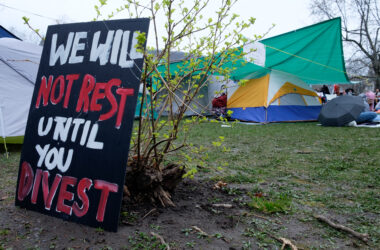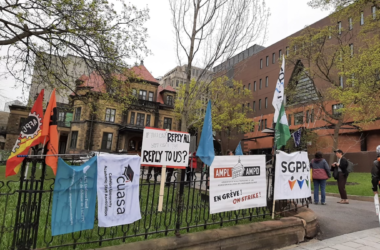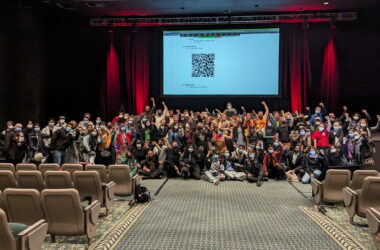 Ryan Reisert / McGill Tribune
Ryan Reisert / McGill TribuneLast Wednesday, the Newman Centre and McGill Chaplaincy hosted a forum titled “The Strike and the Academy: A Forum on the Ethics of Conflict and Collegiality,” to discuss concerns regarding the ongoing MUNACA strike. The panel emphasized the strike’s effects on the university community, and the necessity of holding an open and unbiased discussion of these disputes. The discussion consisted of MUNACA member Christina Tremblay, associate professor in the department of pharmacology, Terence Hébert, management professor, Robert Hebdon, and student representative Eric Mauser.
According to Dan Cere, professor of religious studies, a reason that the Newman Centre hosted the event is that it’s “a Catholic organization, and this community has a long tradition of interest in labour issues and the rights of labour, going back to the first social encyclical on labour in 1891.”
“I’m not going to make profound judgments of who’s right or wrong or who did what to whom during this particular conflict,” Hebdon, who specializes in labour relations, said. “It’s a difficult time for employers to bargain and to address real injustices … There’s a legitimacy on both sides.”
Hébert said that neither the McGill administration nor MUNACA have shown the degree of mutual respect and value for independent thought that is generally assumed to exist at a university.
“Collegiality is something we all pay lip service to, but none of us really act collegially unless it suits us,” Hébert said. “I should be able to tell the principal that I disagree with her in strongest terms [and] not [worry] about her firing me.”
Panelists also addressed the way that the diminished sense of collegial spirit has caused confusion, tensions, and negativity. Hebdon said that professors are strained by their differing loyalties to McGill, their coworkers on strike, and their students.
“The strike brings some of those loyalties into conflict,” Hebdon said. “And we have to reconcile them.”
Mauser added that the negative atmosphere of these conflicts is intensified by the confusing information that students receive from both sides of the negotiations.
“The vast majority of students … know the reasons [behind the strike],” Mauser said. “But we can’t understand why an agreement isn’t being reached.”
Panelists also discussed the possibility that the communication between students, strikers and the administration has been challenging because the university lacks a cohesive set of principles with which to address the situation. The administration, they said, views students very differently compared to how students and professors view the administration.
“[The administration] sees [students] as clients, and they see us as employees,” Hébert said. “They run it like a business.”
“To think [a student is] a client, for me, that’s insulting,” Tremblay said. “It’s hard to become a community or say that we are a community when we are being told to serve clients.”
Mauser added that many McGill students agree that the wages of MUNACA workers should be increased, but are concerned about how they will be affected by such a change.
“We’re worried that the strike may increase our tuition fees ultimately,” he said. “Ultimately, the money’s got to come from somewhere, and it’s going to come from us.”
Looking forward, panelists were hopeful for chances of reconciliation, but also saw potential sources of conflict. Most MUNACA workers look forward to returning to work at a place where they are supported by their coworkers and students, Tremblay noted. Some, however, will face new challenges as they reintegrate into the workforce.
“There are [other MUNACA members] who are terrified, because they do work directly with the higher admin at McGill,” Tremblay said. “They are afraid of the way they are going to be treated [when they return].”
Regarding the future of university relations, Hébert expressed hopes that the limitations of the negotiation process will raise awareness for the necessity of change.
“It tells us who we are, and it strips away the pretence that universities are collegial places of free inquiry,” Hébert said. “[But it’s] still something worth fighting for at McGill.”








